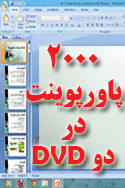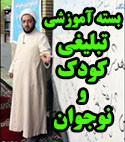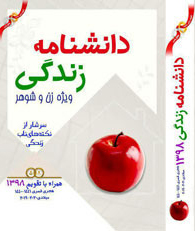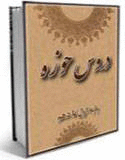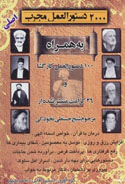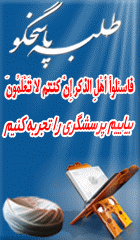A Selection of hadiths from the Holy Prophet Muhammad (SAWA)

The Prophet Muhammad (S) has spoken about various aspects of human life, both worldly and heavenly, and his words are curative prescriptions for the various illnesses of human beings. In addition to the sayings quoted in this paper, he has communicated many others on topics too numerous to mention, and on diverse topics such as women, children, orphans, justice, government, leisure and sport, entertainment, selflessness and sympathy, self-restraint, truthfulness, watchfulness, cheating, oppression, relatives, animals and the environment.
God and Man
“God's kindness towards His creatures is more than a mother's towards her baby.”1
“Remembrance of God is like polish for the heart.”2
“Serve God as you would if you could see Him because although you cannot see Him, He can see you.” 3
“God does not look at your appearance or your possessions, but He looks at your heart and your deeds.” 4
The Faithful
A man asked: “O Prophet of God! What is faith?” The Prophet said: “You are a person of faith when your good deed gives you pleasure and your evil deed grieves you.” 5
“A believer is like a mirror to another believer. A believer is a brother to another believer.” 6
“The most faithful of you are the best mannered.” 7
“Believers are like the different parts of a building, each one supporting the other.” 8
“You will observe that the believers are like parts of the body in relation to each other in matters of kindness, love and affection. When one part of the body is afflicted, the entire body feels it, there is loss of sleep and a fever develops.” 9
The True Muslim
“The perfect Muslim is not perfect if he eats until he is full and yet leaves his neighbours hungry.” 10
“A perfect Muslim is the one from whose tongue and hands his fellow brothers and sisters are safe.”11
Wisdom, Knowledge and Thought
“Fearing God is the peak (or source) of wisdom.” 12
“Ignorance is the worst kind of poverty, intellectuality is the greatest of riches, and thought is the best form of worship.” 13
“Seek knowledge even in China because acquiring knowledge is obligatory for every Muslim.”14
“Seek knowledge from the cradle to the grave.”15
“Retain knowledge by writing it down (recording it).”16
Society
“The best people are those who are the most useful to others.”17
“A moment of justice is better than a year of worship.”18
“Cursed be he who imposes his burden on people.”19
“The best struggle (jihad) is a just word before a tyrannical authority.”20
Friendship and Love
“It is better to sit alone than in the company of bad people and it is even better to sit with good people rather than alone. It is better to speak to a seeker of knowledge than to remain silent; but silence is better than idle words.”21
The Prophet of Islam said: “The Apostles said to Jesus: “O Spirit of Allah! With whom should we keep company?” He said: “The person the sight of whom reminds you of God, the speech of whom increases your knowledge and the deeds of whom make you desirous of the other world.”” 22
“Seven people shall be sheltered by God in the Shade of His Throne when there will be no shade except His Shade… and two people that love each other for the sake of God….”23
Family Ties
“The best person among you is the one who treats his family members the best and I am the person who treats his family in the best way.”24
A man once told the Prophet that he had many children but had not kissed any of them. The Prophet (S) replied: “Verily, God will only show mercy to those of His servants who show mercy to others.” 25
A person came to the Messenger of God (S) and asked, “Who among people is most deserving of my good treatment?”' He said, “Your mother, then your mother, then your mother, then your father, then those closest to you, then those closest to you”26
“A child’s affectionate look at their parents is a form of worship.”27
“Paradise is under the feet of mothers.”28
Equality of Human Beings
“The God of all people is the same and the father of all people is the same. All of you are children of Adam and Adam was made from earth. The most honourable of you in God’s estimation is the most pious.”29
“Be careful because you are not better than people who are a different color, unless you are better in piety.”30
Neighbours
“Gabriel (the Angel of Revelation) is always instructing me about neighbours, so much so that I think that neighbours may inherit from their neighbours.”31
“The person whose neighbour is not safe from his bad behaviour will not enter Heaven.”32
Peace
“Forgive him who wrongs you, re-unite with him who cuts you off, do good to him who does you harm and speak the truth although it may be to your disadvantage.”33
“Do you know what is better than charity, fasting, and prayer? It is keeping peace and good relations between people, as quarrels and bad feelings destroy mankind.”34
Good Conduct and Morality
“If you guarantee me six things on your part, I shall guarantee you Paradise: Speak the truth when you talk, keep a promise when you make it, when you are trusted with something fulfil your trust, avoid sexual immorality, lower your gaze (out of modesty) and prevent your hands and tongue from committing injustice.”35
“The best people are the best mannered.”36 &37
“On the Day of Resurrection nothing will weigh heavier in the scale of the believer than good manners.”38
“When you see flatterers, throw dust in their faces.”39
“Whoever is kind, God will be kind to him; therefore be kind to man on earth. He Who is in heaven will then show mercy to you.”40
If Prophet Muhammad (S) heard the crying of a child in the company of its mother during prayer, he would recite only a short chapter of the Holy Qur'an (in order to finish the prayer more quickly and let the mother comfort her child).41
“Love of this world (dunya) is the origin of every sin.”42
Control of Anger
“Anger is like the devil. The devil has been created from fire and fire is extinguished by water. Therefore, when any of you feels angry, you should perform ablution”.43
“Three things are part of the good morals of a believer. When he is overcome by anger, his anger should not drive him to falsehood. When he is happy, his happiness should not take him beyond the bounds of what is right. When he has power, he should not stake a claim to something which is not his.”44
Modesty
“Modesty (haya) does not bring anything except good.”45
“God has revealed to me that you must be humble. No one should boast over another, and no one should oppress another.”46
“If someone does not feel ashamed of anything, then he is likely to do whatever he likes.”47
Patience
“How wonderful is the situation of a believer. There is good for him in everything and this applies only to a believer. If prosperity comes to him, he expresses gratitude to God and that is good for him; and if adversity befalls him, he endures it patiently and that is better for him.” 48
“Understand that victory comes to the one who is patient.”49
The Golden Rule
“None of you (truly) believes until he wishes for his brother what he wishes for himself.”50
Harmfulness of Envy
“Truly, envy eats up and takes away good deeds as fire eats up and burns wood.”51
Bibliography
‘Amili, Sayyed Muhammad b. Muhammad b. Hasan, Ithna ‘Ashariyyah fi al-Mawa‘iz al-‘Adadiyyah, (Qum: Hekmah Publication, without date.)
Harrani, Abu Muhammed al-Hasan b. Ali (2001), Tuhaf al-‘Uqul, Trans. by Badr Shahin, (Qum: Ansariyan Publications)
Kulayni, Muhammad (1379 A.H), Al-Furu‘ Min al-Kafi, (Tehran: Dar al-Kutub al-Islamiyah)
Kulayni, Muhammad (1388 A.H), Usul al-Kafi (Tehran: Dar al- Kutub al-Islamiyah)
Majlisi, Muhammad Baqir (1983), Bihar al-Anwar (Beirut: Al-Wafa)
Nishaburi, Muhammad b. al-Fattal (1386), Rawdat al-Wa‘izin (Qum: al-Sharif al-Razi Publications)
Payande, Abulqasim (1337), Nahj al-Fasahah, (Tehran: al- Islamiyya Publication)
Waseti, Ali b. Muhammad al-Laysi (1376), ‘Uyun al-Hikam wa al-Mawa‘iz, (Qum: Dar al-Hadis)
1.
إن الله تعالى أرحم بعبده من الوالده المشفقه بولدها
Rawdat al-Wa‘izin, p. 503.
2.
ذكر الله جلاء الصدور
‘Uyun al-Hikam wa al-Mawa‘iz, p. 256.
3.
أعبد الله كأنك تراه فإن كنت لا تراه فإنه يراك
Nahj al-Fasahah, Tradition 335.
4.
إن الله تعالى لا ينظر إلى صوركم وأموالكم ولكن ينظر إلى قلوبكم وأعمالكم
Nahj al-Fasahah, Tradition 719.
5.
إذا سرتك حسنتك وسأتك سيأتك فأنت مؤمن
Nahj al-Fasahah, Tradition 215 and Ithna ‘Ashariyya fi al-Mawa‘iz al-‘Adadiyyah, p. 10.
6.
المؤمن مرآت المؤمن، المؤمن أخ المؤمن
Ithna ‘Ashariyya fi al-Mawa‘iz al-‘Adadiyya, p. 8
7.
افضلكم إيمانا أحسنكم أخلاقا
Nahj al-Fasahah, Tradition 420 and Tuhaf al-‘Uqul, Tradition 69.
8.
المؤمن للمؤمن كالبناء يشتد بعضه بعضا
Ithna ‘Ashariyyah fi al-Mawa‘iz al-‘Adadiyyah, p. 8
9.
مثل المؤمنين في توادهم وتراحمهم كمثل الجسد إذا أشتكى بعضهم تداعى سائرهم بالسهر والحمى
Nahj al-Fasaha, Tradition 2712.
This tradition is narrated from Imam Sadiq in Usul al-Kafi, Vol. 2, p. 133 like this:
المؤمن أخو المؤمن كالجسد الواحد، أن اشتكى شيئا منه وجد ألم ذلك في سائر جسده
10.
ما أمن بالله واليوم الاخر من بات شبعان وجاره جائع
Bihar al-Anwar, Vol. 75, p. 273
11.
المسلم من سلم المسلمون من يده ولسانه
Ithna‘Ashariyyah fi al-Mawa‘iz al-‘Adadiyyah, p. 8
12.
رأس الحكمة مخافة الله
Ithna‘Ashariyyah fi al-Mawa‘iz al-‘Adadiyyah, p. 8
13.
لا فقر أشد من الجهل ولا مال أعود من العقل... ولا عبادة مثل التفكر
Nahj al-Fasahah, Tradition 2505.
14.
أطلبوا العلم ولو بالصين فإن طلب العلم فريضة على كل مسلم
Nahj al-Fasahah, Tradition 324.
15.
أطلبوا العلم من المهد إلى اللحد
Nahj al-Fasahah, Tradition 327.
16.
فيدوا العلم بالكتاب
Tuhaf al-‘Uqul, Tradition 8 and Ithna ‘Ashariyyah, p. 14.
17.
سئل رسول الله صلى الله عليه وآله من احب الناس إلى الله؟ قال: أنفع الناس للناس
.
Usul al-Kafi, Vol. 2, p. 131.
18.
عدل ساعة خير من عبادة سنة
Nahj al-Fasahah, Tradition 1936.
19.
ملعون من ألقي كله على الناس
Tuhaf al-‘Uqul, Tradition 19.
20.
أفضل الجهاد كلمة حق عند سلطان جائر
Nahj al-Fasahah, Tradition 394.
21.
الوحدة خير من جليس السوء والجليس الصالح خير من الوحدة وأملاء الخير خير من السكوت والسكوت خير من أملاء الشر
Nahj al-Fasahah, Tradition 3194.
22.
قالوا: يا روح الله فمن نجالس إذا؟ قال: من يذكركم بالله رؤيته ويزيد في علمكم منطقه ويرغبكم في الأخرة عمله
Tuhaf al-‘Uqul, Tradition 60.
23.
سبعة يظلهم الله تحت ظل عرشه يوم لا ظل إلا ظله:... ورجلان تحابا في الله...
Tradition 1731 & 1732.
The Prophet also said: "If a man loves his brother in faith, he should tell him that he loves him." (Nahj al-Fasahah, Tradition 1520).
24.
خيركم خيركم لأهله وأنا خيركم لأهلي
Nahj al-Fasahah, Tradition 1520.
25.
أن رسول الله كان يقبل الحسن بن علي عليهما السلام فقال الاقرع بن حابس: أن لي عشرة من الولد ما قبلت أحدا منهم فقال رسول الله )ص): من لا يرحم لا يرحم
.
Rawdat al-Wa‘izin, p. 369.
26.
أمك أمك ثم أمك ثم أباك ثم الأقرب فالأقرب
Nahj al-Fasahah, Tradition 546.
27.
نظر الولد إلى والديه حبا لهم عبادة
Tuhaf al-‘Uqul, Tradition 79.
28.
الجنة تحت أقدام الأمهات
Ithna ‘Ashariyyah fi al-Mawa‘iz al-‘Adadiyyah, p. 8.
29.
أيها الناس إن ربكم واحد وأن أباكم واحد، كلكم لآدم وآدم من تراب إن أكرمكم عند الله أتقاكم
Nahj al-Fasahah, Tradition 1044.
30.
أنظر فإنك لست بخير من أحمر ولا أسود إلا أن تفضله بتقوى
Nahj al-Fasahah, Tradition 562.
31.
ما زال جبريل يوصيني بالجار حتى ظننت أنه سيورثه
Nahj al-Fasahah, Tradition 2640.
32.
لا يدخل الجنة عبد لا يأمن جاره بواغيه
.
Ithna ‘Ashariyyah, p. 15.
33.
واعف عمن ظلمك وصل من قطعك وأحسن إلى من أساء اليك وقل الحق ولو على نفسك
.
Nahj al-Fasahah, Tradition 1842 and Usul al-Kafi, Vol. 2, p. 87.
34.
ألا أخبركم بأفضل من درجة الصيام والصلاة والصدقة؟ صلاح ذات البين فإن فساد ذات البين هي الحالقة
Nahj al-Fasahah, Tradition 458.
35.
تقبلوا إلى بست أتقبل لكم بالجنة إذا تحدثتم فلا تكذبوا وإذا وعدتم فلا تخلفوا وإذا ائتمنتم فلا تخونوا وغضوا أبصاركم واحفظوا فروجكم وكفوا أيديكم وألسنتكم
Ithna ‘Ashariyyah, p. 226.
36. See also No 7.
37.
خير الناس أحسنهم خلقا
Nahj al-Fasahah, Tradition 1498.
38.
ليس شيء أثقل في الميزان من الخلق الحسن
Nahj al-Fasahah, Tradition 2397.
39.
أحثوا التراب في وجوه المداحين
Nahj al-Fasahah, Tradition 91.
40.
الراحمون يرحمهم الرحمن تبارك وتعالى إرحموا من في الأرض يرحمكم من في السماء
Nahj al-Fasahah, Tradition 1679 and Ithna ‘Ashariyyah, p. 14.
41.
صلى رسول الله )ص) بالناس الظهر فخفف في الركعتين الأخيرتين . فلما انصرف قال له الناس: هل حدث في الصلاة حدث؟... فقال لهم: أما سمعتم صراخ الصبي؟
Al-Furu‘ Min al-Kafi, Vol. 6, p. 48
42.
حب الدنيا رأس كل خطيئة
Nahj al-Fasahah, Tradition 1342.
43.
أن الغضب من الشيطان وأن الشيطان خلق من النار وإنما تطفأ النار بالماء فإذا غضب أحدكم فليتوضأ
Nahj al-Fasahah, Tradition 660.
44.
ثلاث من اخلاق الإيمان: من إذا غضب لم يدخله غضبه في الباطل ومن إذا رضي لم يخرجه رضاه من الحق ومن إذا قدر لم يتعاط ما ليس له
.
Nahj al-Fasahah, Tradition 1267.
45.
الحياء لا يأتي إلا بخير
.
Nahj al-Fasahah, Tradition 1426 and Ithna ‘Ashariyyah, p. 8.
46.
إن الله أوحى إلي أن تواضعوا حتى لا يفخر أحد على أحد ولا يبغي أحد على أحد
Nahj al-Fasahah, Tradition 678.
47.
إذا لم تستحيي فاصنع ما شئت
Nahj al-Fasahah, Tradition 238.
48.
عجبا لأمر المؤمن، إن أمره كله خير وليس ذلك لأحد إلا المؤمن إن أصابته سراء شكر وكان خيرا له وإن أصابته ضراء صبر وكان خير له
Nahj al-Fasahah, Tradition 1932.
49.
إعلم أن النصر مع الصبر
Nahj al-Fasahah, Tradition 363.
50.
لا يؤمن عبد حتى يحب لأخيه ما يحب لنفسه من الخير
Ithna ‘Ashariyyah, p. 15.
51.
أن الحسد ليأكل الحسنات كما تأكل النار الحطب
Ithna ‘Ashariyyah, p. 17.
مطالب مشابه با این موضوع:
وبگــــــــــردی طلبۀ پاسخگو
- فایل اعمال و رفتار های خلاف قانون جناب آقای حسن روحانی
- در کنج خانه طلبهها چه میگذرد؟
- سکوت چند ساله مسئولان حوزه در قبال حملات وحشیانه به طلاب!
- می گویند که مملکت مملکت آخوندهاست!!
- یک ماجرای تلخ که خانم ها با تأمل بیشتر بخونند
- جریان های تکفیری موجود در عراق و نحوه شکل گیری آنها
- سیر تکاملی تفکر سلفیه چگونه بوده است؟
- بداء در قرآن و حدیث چگونه مطرح شده است؟
- پیامبر (ص) با مخالفین خود چگونه بر خورد می کرد؟
- سبک زندگی حضرت زهرا سلام الله علیها
- ملاک کرامت و شرافت افراد، انسانیت است یا جنسیت؟
- رنگ و پوشش های رنگی در اسلام
- حجاب، زنان را افسرده میکند و مانع پیشرفت اجتماعی آنهاست!!!
- علوم لدنی معصومین
- مگر ولی فقیه معصوم است که ولایت مطلقه دارد؟
- اگر خدا ازعاقبت ما اطلاع دارد قیامت برای چیست؟
- آیا بجای نماز خوندن، پیانو یا سه تار بزنم؟
- چرا مراسم عزاداري امام حسين(ع) پيش از شهادت ايشان صورت ميگيرد؟
- چرا امام حسين(ع) در كربلا براي رفع تشنگي از خداوند طلب باران نكرد؟
دانــــــلود های مفیـــــــــــــــــــد
- دانلود پاورپوینت شناخت وهابیت و صهیونیسم و ارتباط با همدیگر
- دانلود دو پاورپوینت اجرای عید غدیر خم
- دانلود پاورپوینت احتجاج اميرمؤمنان (ع) به غدير
- پژوهشی در کلام و پیام مقام معظم رهبری پیرامون ماه رمضان
- خطبه شعبانیه و خطبه امیرالمومنین(علیه السلام) پیرامون روزه و ماه رمضان
- دانلود پاورپوینت و pdf تفاوت های زن و مرد
- دانلود جزوه ساعات سعد و نحس(زمان نوشتن دعا)
- تقویم مذهبی شمیم یار 96 مخصوص کامپیوتر
- دانلود نرم افزار «شیعه شناسی»
- دانلود پاورپوینت ساختار خانواده و مسایل آن
- دانلود کتاب دایره المعارف جنسی
- دانلود نکات جذاب دوران عقد
- دانلود کتاب درمان سرد مزاجی و بی میلی جنسی بانوان
- دانلود کتاب حسادت کودکان
- دانلود کتاب درمان خستگی وناتوانی جنسی
- دانلود پاور پوینت اسیب های ازدواج وخانواده
- دانلود پاورپوینت هشت گام برای تحقق رویا به واقعیت
- دانلود پاورپوینت تقویت اراده
- دانلود پاورپوینت موفقیت وروشهای رسیدن به ان
- دانلود پاورپوینت هنر رفتار با افراد دشوار
- دانلود پاورپوینت جملات جالب وجذاب روحیه بخش بزرگان
- دانلود پاورپوینت راههای مقابله ودرمان استرس
- دانلود پاورپوینت نیازهای اساسی کودکان
منبــــرهای مکــــــــــــــــــتوب
- منبر مکتوب: روز عرفه و فرصت ها
- منبر مکتوب: سبک زندگی امام باقر علیه السلام
- منبر مکتوب: سه نیاز مومن (امام جواد علیه السلام)
- سخنرانی سلسله ای و چند جلسه ای مناسبت ماه رمضان
- دانلود 30 جلسه سخنرانی ماه مبارک با موضوع تنها مسیر
- موضوعات پیشنهادی سخنرانی برای محرم
- فضائل حضرت قمر بنی هاشم علیه السلام
- برکات وجود ابا عبدالله علیه السلام بر عالم
- بررسی بُعد اخلاقی،عبادی و عرفانی عاشورا
- آخرين وصيت امام حسين عليه السلام
- اولین علت رویاروی در کربلا؛ دوری از یاد خدا
- هميشه حزن؟ شادي چرا نه؟ - شب دهم محرم
- چرا نفرين ؟ - شب نهم محرم
- نماز ظهر عاشورا - شب هشتم محرم
- فلسفه عزاداری - شب هفتم محرم
- دفاع از دین - شب ششم محرم
- فلسفه حضور خانواده سيد الشهداء - شب پنجم محرم
- علم امام علیه السلام به شهادت - شب چهارم محرم
- فقدان شرایط امر به معروف و نهی از منکر- شب سوم محرم
مناظرات طلبه پاسخگو
جدیدترین های زبان انگلیسی
- Islam and Its Social System
- Duties of Man Towards the People
- Islam Various Systems
- Attributes of The Real Follower of Imams in Their Teachings
- Who is a Real Shia Muslim?
- RIGHTS OF SCHOLARS
- Islam Attacks Slavery 1
- The Advantages of Religion 2
- The Clearest Reason for Free Will
- Sheikh Zakzaky to be released on bail
- Brief History of Religions
- Is It Necessary For Man To Follow A Religion?
- The Advantages of Religion 1
- Who Is Almighty Allah?
- What are the differences between Shia and Sunni Muslims؟
- The Rights Islam Offers to Women
- How I find that Islam does not Oppress Women?
- URGENT MEDICAL TREATMENT FOR SHEIKH ZAKZAKY
- The motto of this year’s book fair is “Reading Is Ability”.
- Fundamental principles of Islam
بیشترین دانلود ها
- دانلود صوتي تکنیک های نزدیکی زن و شوهر (108246)
- دانلود رایگان کتاب خواص سوره های قرآن (55219)
- دانلود پاورپوینت بسیار مفید مهارت های زندگی (37789)
- دانلود پاورپوینت و pdf تفاوت های زن و مرد (34475)
- دانلود كتاب مسائل جنسي و زناشوئي در احاديث (34028)
- دانلود کتاب دایره المعارف جنسی (32533)
- دانلود پاورپوینت های آموزش پیش از ازدواج (30864)
- دانلود بسیار مفید پاورپوینت آئین همسرداری (30280)
- دانلود 110جلد کتاب بحارالانوار علامه مجلسی ره (29949)
- دانلود پاورپوینت آموزشی بررسی رابطه دختر و پسر (29927)
- دانلود كتاب دختران خوب به آسمان می روند دختران بد به همه جا (28840)
- دانلود کتاب درمان سرد مزاجی و بی میلی جنسی بانوان (28682)
- دانلود کتاب آموزش جنسی آقایان (28579)
- دانلود كتاب فرق و مذاهب كلامي استاد رباني گلپايگاني (28513)
- دانلود نکات جذاب دوران عقد (28229)
- دانلود نرم افزار «شیعه شناسی» (26588)
- دانلود کتاب درمان خستگی وناتوانی جنسی (25756)
- دانلود پاورپوینت تقویت اراده (24219)
جدیدترین مطالب سایت
- پاسخ به شبهات ولایت (4815) بازدید
- پاسخ به شبهات ولایت (4605) بازدید
- اذان در جامعه اسلامی نماد چیست ؟ و چرا فقط سه بار در روز تکرار می شود ؟ (3970) بازدید
- باتوجه به عادل بودن خداوند چرا بعضی از انسانها را ناقص الخلقه آفریده است ؟ (4063) بازدید
- ویژگی خاص قرآن چیست که کسی نمی تواند مانند آن را بیاورد ؟ (4337) بازدید
- با توجه به ترک خود ارضایی عوارض آن هنوز در من هست چگونه آن را برطرف کنم ؟ (5707) بازدید
- آیا بدن اخروی مانند بدن مادی است ؟چهره ی واقعی انسان در قیامت چگونه است ؟ (5157) بازدید
- آیا ادعای ملاقات امام زمان (عج) از جانب برخی افراد صحت دارد ؟ (4644) بازدید
- چرا به اصول و قواعد دین اسلام توجه نمی شود و پذیرش آن از سوی پیروان ادیان دیگر سخت است ؟ (5035) بازدید
- فلسفه وجود لباس روحانیت در عصر حاضر چیست ؟ (3622) بازدید
- آیا وظیفه یک روحانی تنها راهنمایی مردم و فعالیت و تدریس در حوزه هاست ؟ (3007) بازدید
- آیا نظریه تناسخ از دیدگاه اسلام پذیرفته شده است ؟ (5393) بازدید
- آیا توصیف بهشت و جهنم در قرآن تمثیل هایی برای درک بهتر آن جهان است ؟ (4987) بازدید
- با توجه به اینکه اسلام کاملترین دین هست چرا ما نسبت به کشور های غیر مسلمان عقب مانده تر هستیم ؟ (6919) بازدید
- نقش امام و رهبر در جامعه اسلامی چیست ؟ و اگر نباشد چه اتفاقی می افتد ؟ (4661) بازدید
پربازدیدترین های سایت
- زنی هستم که میخواهم به شوهرم خیانت کنم!!! (605583)
- آيا زن شوهر دار بخاطر رفع نیاز جنسی اش ميتواند صیغه شود؟ (501204)
- دوست دخترم حامله شده چکار کنم؟ (398748)
- میل جنسی زیادی دارم و به شدت داره منو عذاب می ده (340802)
- دیدن فیلم های مبتذل زن و شوهر برای تحریک شدن جنسی (217963)
- چگونه همسرمان را آماده آميزش جنسي كنم؟+18 (213270)
- حکم شرعی نزدیکی از پشت! (208281)
- خانم هایی که می خواهند طلبه شوند بخوانند!!! (205792)
- زنم رابطه جنسی برقرار نمیکند!!! (199781)
- از تجربه های تلخ و تکان دهنده دختران بخوانید شاید... (172502)
- گناه با محارم خود داشتم! (146504)
- رابطه جنسی دهانی حكم چيست؟ (131107)
- محرمات و مکروهات و مستحبات حائض+حکم ورد به امکان مقدسه (129617)
- به رابطه خانمم با خواهر زاده اش مشکوکم؟ (123529)
- سفارش اسلام در مورد آمیزش صحیح چیست؟ (99159)
- نام كتاب حضرت نوح و حضرت ابراهیم؟ (97218)
- با زنان چشم سبز ازدواج نکنیم؟ (94990)












